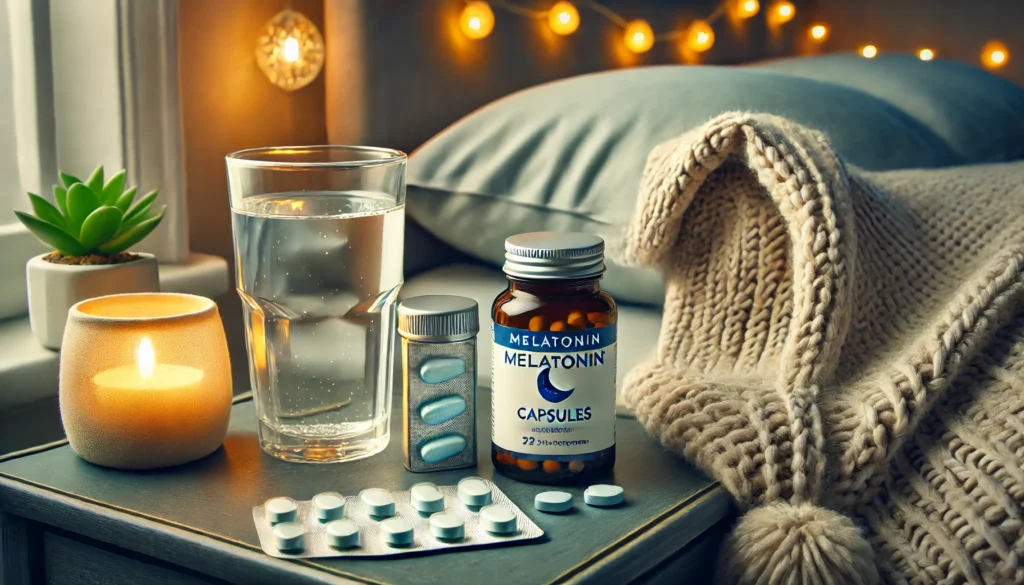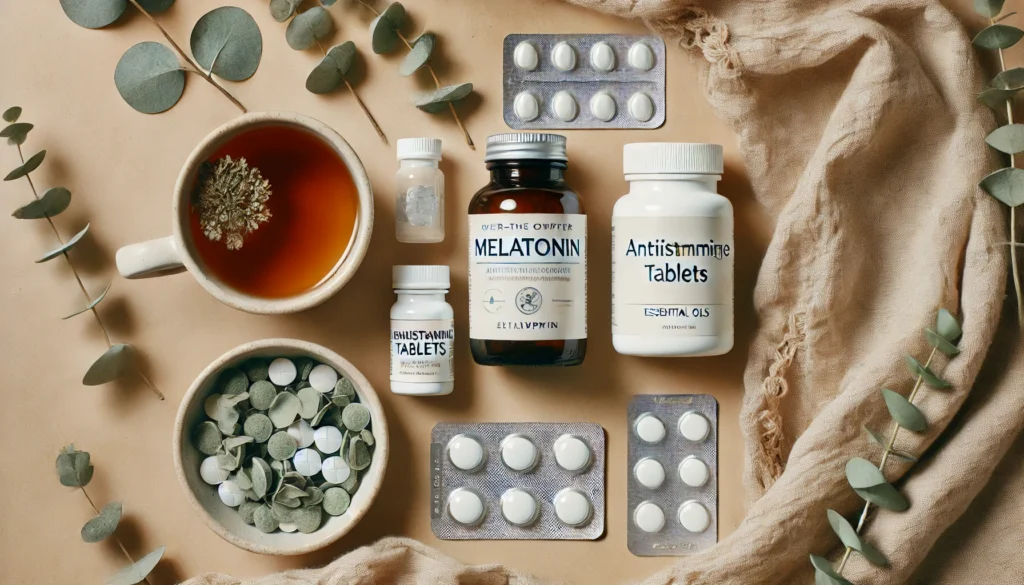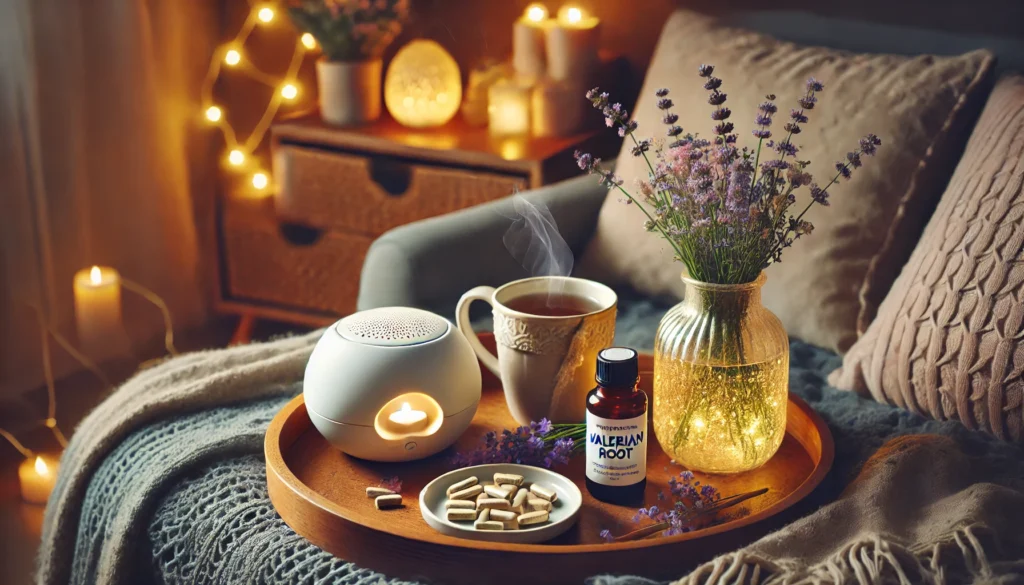Sleep anxiety is a common issue that affects many people. It’s a condition where worry and fear interfere with one’s ability to fall asleep or stay asleep.
This can lead to a vicious cycle. Anxiety can cause sleep problems, and lack of sleep can increase anxiety.
There are various medications available to help manage sleep anxiety. These range from prescription drugs to over-the-counter options.
However, finding the right medication can be a challenge. It’s important to understand the benefits and potential side effects of each option.
This article aims to provide a comprehensive overview of effective medications for sleep anxiety relief. It will delve into the mechanisms of action, potential side effects, and how they fit into a broader sleep disorder treatment plan.
The goal is to provide reliable and accessible information. This can help health and wellness coaches guide their clients, assist science journalists in their work, and aid biohackers in optimizing their mental and physical health.
By the end of this article, you’ll have a better understanding of the various medication options for sleep anxiety. You’ll also learn about non-pharmacological treatments and lifestyle changes that can complement medication use.
You may also like: Top Supplements to Alleviate Anxiety Naturally

Understanding Sleep Anxiety and Its Impact on Health
Sleep anxiety is a unique condition where fear of sleeplessness leads to restless nights. It intertwines anxiety with an inability to achieve restful sleep. Chronic sleep disturbances can significantly affect overall well-being. Sleep is essential for the body’s physical and mental recovery.
The impact of sleep anxiety extends beyond tiredness. It influences emotional stability, mental acuity, and physical health. Ongoing sleep deprivation can exacerbate existing health conditions.
Underlying anxiety often drives sleep issues. Anxiety triggers the release of stress hormones, which disrupt the body’s natural sleep cycle. Understanding this relationship is key to addressing sleep anxiety effectively.
To effectively manage sleep anxiety, it’s crucial to diagnose it correctly. This requires recognizing symptoms and understanding the underlying anxiety. Various medications are available, but a tailored approach is essential.
Sleep anxiety’s impact emphasizes the need for comprehensive treatment strategies. Medications, lifestyle changes, and non-pharmacological therapies all play a role. These strategies can help break the cycle of anxiety and sleeplessness.
Sleep anxiety is more than just a struggle to fall asleep; it’s a condition that affects overall health. Addressing it involves a multifaceted treatment plan. This plan includes medication options, cognitive therapies, and lifestyle adjustments.
Prevalence and Symptoms of Sleep Anxiety
Sleep disorders, including sleep anxiety, are widespread. Millions suffer from them globally, impacting various facets of life. The prevalence highlights a growing need for effective solutions.
Symptoms of sleep anxiety often include difficulty falling or staying asleep. This may be accompanied by persistent worry about one’s ability to sleep. Physical symptoms can include a racing heart, sweating, and muscle tension.
The pervasive nature of sleep anxiety means it’s not isolated to a few. Many may experience similar patterns of anxiety and sleeplessness. Recognizing these signs is crucial for seeking appropriate treatment and support.
The Relationship Between Anxiety and Sleep Disturbances
Anxiety and sleep disturbances share a complex and cyclical relationship. Anxiety often leads to sleeplessness, while lack of sleep can intensify anxiety. This cycle makes addressing sleep disturbances challenging.
The brain’s response to anxiety involves heightened alertness. This process can delay sleep onset, interfering with the natural sleep rhythm. Chronic anxiety often disrupts restorative sleep, impacting daytime alertness.
Sleep disturbances from anxiety can manifest in various ways. These include insomnia, frequent awakenings, and poor sleep quality. Understanding this relationship is vital for developing effective treatment strategies. Addressing both anxiety and sleep disturbances together provides a more comprehensive solution.
Medication Options for Sleep Anxiety
For those grappling with sleep anxiety, medication can offer relief. Various options exist, each with unique benefits and potential downsides. Finding the best medicine for sleep anxiety involves understanding these choices.
Prescription medications aim to calm anxiety and promote sleep. They can reduce the cycle of stress and insomnia. Physicians may prescribe different classes of drugs based on individual needs.
Non-prescription options also play a role. These include over-the-counter sleep aids like antihistamines and natural supplements. Such remedies might be appealing for those preferring less intense interventions.
The importance of expert guidance when choosing sleep anxiety medicines cannot be overstated. Personalized advice from healthcare providers is crucial. This ensures that medications align with individual health requirements and goals.
Benzodiazepines: Uses and Cautions
Benzodiazepines are often used for managing anxiety and sleep problems. They act quickly by enhancing the effects of a neurotransmitter called GABA. This induces calmness and helps initiate sleep.
Commonly prescribed benzodiazepines include:
- Diazepam (Valium)
- Lorazepam (Ativan)
- Clonazepam (Klonopin)
- Alprazolam (Xanax)
These medications are effective but carry specific cautions. They have a high potential for dependency, especially with long-term use. Withdrawal can be challenging if discontinued abruptly.
Additionally, side effects may occur. These can include dizziness, confusion, or impaired coordination. It’s essential to follow a doctor’s guidance about dosage and duration.
Due to these considerations, benzodiazepines might be best suited for short-term use. Long-term reliance on them raises concerns about dependence and tolerability. It’s critical to weigh risks and benefits with healthcare professionals when considering benzodiazepines.
Non-Benzodiazepine Hypnotics
Non-benzodiazepine hypnotics, often called “Z-drugs,” offer an alternative. They are designed to address insomnia and related sleep disturbances. They work by promoting relaxation and facilitating the onset of sleep.
These medications include:
- Zolpidem (Ambien)
- Eszopiclone (Lunesta)
- Zaleplon (Sonata)
Each medication has distinct characteristics and uses. Z-drugs target specific sleep cycle stages. Unlike benzodiazepines, they typically present a lower risk for addiction.
Nonetheless, non-benzodiazepine hypnotics aren’t without drawbacks. They can still cause side effects like sleepwalking or memory lapses. Users must adhere to prescribed guidelines to minimize these risks.
Overall, Z-drugs present viable options for those seeking non-benzodiazepine solutions. They offer a middle ground between traditional sleep aids and stronger prescription medications. Consulting with a healthcare provider helps ensure appropriate use.
Antidepressants with Sedative Effects
Antidepressants sometimes serve dual purposes. They can address anxiety disorders while aiding sleep. Certain types have sedative effects, beneficial for sleep anxiety.
Common options include:
- Trazodone
- Mirtazapine (Remeron)
- Doxepin (Silenor)
These drugs modulate neurotransmitter levels in the brain, improving mood and relaxation. Their sleep-inducing qualities can help regulate sleep patterns.
However, antidepressants require careful monitoring. They may cause side effects like weight gain, dry mouth, or daytime drowsiness. Adjustments in dosage can help manage these effects.
For those with concurrent anxiety and mood disorders, antidepressants provide a comprehensive approach. They target both emotional and sleep aspects, offering holistic benefits. Correct medication and dosage align with individual profiles and health considerations.
Over-the-Counter Options: Antihistamines and Melatonin
Over-the-counter (OTC) solutions appeal due to accessibility and ease of use. Antihistamines, often found in allergy medicines, provide sedative effects. Common examples include diphenhydramine (Benadryl) and doxylamine (Unisom).
Melatonin supplements offer another route for managing sleep anxiety. They mimic the body’s natural sleep hormone, supporting better sleep regulation.
Pros and cons exist for both types:
- Antihistamines can cause next-day drowsiness and are not recommended for long-term use.
- Melatonin is generally well-tolerated but may not be effective for all individuals.
Benefits of these OTC options include their potential for non-prescription management. They’re ideal for those seeking mild interventions without medical consultation.
Yet, it’s essential to understand potential interactions with other medications. Even OTC solutions can have unexpected effects. Consulting a healthcare professional ensures safety and efficacy when integrating these options into a sleep regimen.

Non-Pharmacological Treatments and Lifestyle Changes
Addressing sleep anxiety requires more than just medication. Integrating non-pharmacological treatments can significantly enhance outcomes. These methods focus on altering habits and behaviors that contribute to anxiety and poor sleep.
Lifestyle changes form the foundation of these strategies. Simple adjustments can lead to improved sleep quality. Such modifications include diet, exercise, and routine management.
Additionally, behavioral therapies play a crucial role. Cognitive-behavioral therapy (CBT) is a highly effective treatment modality. It helps reframe the thoughts that trigger anxiety, paving the way for better sleep patterns.
Moreover, the importance of a stable sleep schedule cannot be overstated. Regular sleep-wake times help regulate the body’s internal clock. This consistency builds healthier sleep patterns over time.
To maximize the benefits, one should consider the following lifestyle changes:
- Adopting a balanced diet, including sleep-promoting nutrients.
- Incorporating regular physical activity to reduce stress.
- Establishing a wind-down routine before bedtime.
- Minimizing caffeine and alcohol intake in the evening.
Together, these non-pharmacological methods present a holistic approach. They work in tandem with medications, providing a comprehensive treatment framework for sleep anxiety.
Cognitive-Behavioral Therapy (CBT) for Insomnia
CBT stands out as a prominent non-medication treatment. It’s particularly effective for those dealing with insomnia linked to anxiety. This therapy focuses on altering patterns of thinking and behaviors that contribute to sleep issues.
The process of CBT involves identifying negative thought patterns. These could include worries about sleep difficulties or fears about the consequences of poor rest. Once identified, a therapist helps the individual address and modify these thoughts.
CBT also incorporates various behavioral strategies. These might involve stimulus control techniques or sleep restriction. Ultimately, this approach aims to create a positive sleep environment and mindset. Individuals often find significant improvements in sleep quality without medication reliance.
Relaxation Techniques and Sleep Hygiene
Relaxation strategies can effectively complement traditional treatments for sleep anxiety. Techniques such as deep breathing, meditation, and progressive muscle relaxation help decrease tension. They soothe the mind and body, facilitating a smoother transition into sleep.
In addition to relaxation techniques, maintaining good sleep hygiene is vital. Proper sleep hygiene involves adopting habits that promote consistent, good-quality sleep. This includes both environmental and lifestyle adjustments.
Key components of sleep hygiene include:
- Creating a comfortable sleep environment (cool, dark, and quiet).
- Establishing a regular sleep schedule (even on weekends).
- Limiting screen time before bed to minimize blue light exposure.
- Ensuring a relaxing pre-sleep routine to signal the body to unwind.
By integrating these practices, individuals can enhance their sleep quality naturally. These adjustments, alongside relaxation techniques, form a robust foundation for managing sleep anxiety holistically.
Potential Side Effects and Risks of Sleep Anxiety Medications
Taking medication for sleep anxiety can offer relief, but it is crucial to be aware of the potential side effects. Many medications come with risks that need careful consideration. These risks are significant factors in determining the appropriate treatment for individuals.
Common side effects include daytime drowsiness, dizziness, and difficulty concentrating. Some individuals may also experience digestive issues or dry mouth. It’s important for users to monitor how these effects influence their daily life.
In more serious cases, medications can impact breathing, especially during sleep. This is particularly critical for individuals with existing respiratory issues. Consulting a healthcare provider can help mitigate such risks.
Long-term use can lead to complications such as cognitive impairments. Always use medications as directed and discuss any changes in condition with a healthcare professional. This approach ensures that treatment remains safe and effective.
Dependency and Withdrawal: What to Know
One of the main concerns with sleep anxiety medications is the potential for dependency. Benzodiazepines, in particular, can be habit-forming. Users may develop a tolerance, requiring higher doses for the same effect.
Once dependent, discontinuing use can lead to withdrawal symptoms. These symptoms can include anxiety, irritability, and, in severe cases, seizures. It’s essential to approach medication changes cautiously under medical supervision.
Healthcare providers often recommend tapering off gradually. This approach minimizes withdrawal symptoms, making discontinuation more manageable. Awareness and planning are key to reducing dependency risks.
Interactions with Other Medications and Substances
Medications for sleep anxiety can interact with other drugs and substances. Such interactions can alter the effectiveness or increase the risk of side effects. It’s crucial to be upfront with healthcare providers about all current medications.
For example, combining benzodiazepines with alcohol can be dangerous. It can amplify sedative effects, leading to increased drowsiness or even respiratory depression. Stimulants like caffeine can counteract the intended effects of sedatives.
Additionally, some antidepressants used for sleep anxiety might have interactions with herbal supplements. St. John’s Wort is one example, as it can alter the metabolism of various medications. Therefore, always seek professional advice when adding or changing supplements.
Maintaining transparency about any other treatments ensures safety. This communication allows healthcare providers to adjust dosages or suggest alternatives when necessary. In turn, this proactive approach fosters effective and safe treatment management.

The Role of Healthcare Providers in Sleep Disorder Treatment
Healthcare providers are integral to the effective management of sleep disorders. They bring expertise in diagnosing and treating sleep anxiety. Their insights guide individuals to safe and effective treatment options.
Accurate diagnosis is a crucial first step. Providers assess a patient’s symptoms and overall health condition. They may recommend sleep studies or other diagnostic tests for clarity.
Post-diagnosis, a tailored treatment plan is developed. Providers consider factors like lifestyle, other health conditions, and personal preferences. This approach ensures treatment is personalized and holistic.
Personalized Medication Selection and Monitoring
Selecting the right medication for sleep anxiety is not a one-size-fits-all process. Healthcare providers choose medications based on an individual’s specific needs and health history. This personalized approach helps maximize effectiveness while minimizing risks.
Continuous monitoring is essential once medication is initiated. Providers track progress, adjusting dosages or changing medications as needed. This dynamic process ensures the ongoing effectiveness of the treatment.
Monitoring also helps identify any adverse effects early on. Providers can make necessary changes swiftly to prevent complications. This vigilance is key to maintaining patient safety and improving outcomes.
The Importance of Ongoing Assessment and Adjustment
Effective sleep anxiety treatment requires regular assessment by healthcare providers. Periodic evaluations ensure that the treatment remains aligned with the patient’s needs. These assessments evaluate not only the effectiveness but also the safety of the current regimen.
Healthcare providers are skilled in interpreting changes in symptoms. Such changes might indicate the need for an adjustment in medication or other treatment strategies. This ongoing attention helps maintain progress and prevent setbacks.
Adjustments are sometimes necessary when life circumstances change. Factors like increased stress or new health issues can affect how someone responds to treatment. Providers are there to adapt the plan, ensuring continuous support and management.
Emerging Therapies and Future Directions in Sleep Anxiety Treatment
The landscape of sleep anxiety treatment is evolving. Emerging therapies hold promise for more effective and personalized approaches. These innovations aim to address the limitations of current treatments.
One area of focus is developing new medications with fewer side effects. Researchers are exploring compounds that target specific brain receptors. These can potentially offer better outcomes and improved safety profiles.
In addition to pharmacological advancements, technology is playing a significant role. Wearable devices and apps track sleep patterns and provide real-time data. This information aids both individuals and healthcare providers in optimizing treatment strategies.
Innovative therapies are also addressing the root causes of sleep anxiety. This involves looking beyond symptoms to understand underlying issues. By tackling these foundational factors, treatments can become more comprehensive.
Research Trends and New Medication Developments
Research in sleep anxiety is dynamic and promising. Scientists are investigating cutting-edge treatments that promise more targeted relief. One trend involves studying the brain’s intricate signaling pathways.
New medications are on the horizon aimed at targeting specific neurotransmitters. These include compounds that enhance or balance brain chemicals linked to sleep and anxiety. Such precision can improve treatment efficacy and reduce unwanted effects.
Additionally, genetic research is opening doors to personalized medicine. Understanding genetic predispositions can tailor treatments uniquely to patients. This gene-specific approach represents a significant leap in delivering individualized care.
Biohacking and Alternative Approaches
Biohacking is gaining traction among those aiming to optimize mental health. Enthusiasts employ novel methods to enhance sleep and reduce anxiety. Here are some key biohacking tactics making waves:
- Nootropic supplements: These aim to boost brain function and regulate mood.
- Light therapy: Utilizes specific light wavelengths to influence sleep-wake cycles.
- Wearable tech: Monitors sleep parameters to help users adjust lifestyle habits.
Alternative practices also play a vital role in holistic treatment strategies. Techniques such as mindfulness and meditation are popular for their calming effects. They complement medication, offering a comprehensive approach to managing sleep anxiety.
Conclusion: Integrating Medication with Holistic Health Strategies
Addressing sleep anxiety requires a balanced approach. Combining medication with holistic health strategies offers the most robust solution. This synergy ensures comprehensive management of sleep and anxiety issues.
Medications can provide immediate relief from acute symptoms. However, they should be part of a broader treatment plan. This includes lifestyle changes that promote long-term wellness.
Integrating techniques such as mindfulness, exercise, and sleep hygiene enriches treatment outcomes. These methods foster relaxation, enhance sleep quality, and reduce reliance on medication. Working together with healthcare providers, individuals can create a personalized strategy.
Achieving optimal sleep health is a continuous journey. It involves adapting strategies to fit changing needs. By embracing both medical and holistic interventions, people can better navigate the challenges of sleep anxiety. This integrated approach empowers individuals to take control of their mental and physical health.
Further Reading:
Which medication is best for anxiety and insomnia?
Which Drugs Treat Anxiety Disorder?
Important Note: The information contained in this article is for general informational purposes only, and should not be construed as health or medical advice, nor is it intended to diagnose, prevent, treat, or cure any disease or health condition. Before embarking on any diet, fitness regimen, or program of nutritional supplementation, it is advisable to consult your healthcare professional in order to determine its safety and probable efficacy in terms of your individual state of health.
Regarding Nutritional Supplements Or Other Non-Prescription Health Products: If any nutritional supplements or other non-prescription health products are mentioned in the foregoing article, any claims or statements made about them have not been evaluated by the U.S. Food and Drug Administration, and such nutritional supplements or other health products are not intended to diagnose, treat, cure, or prevent any disease.


